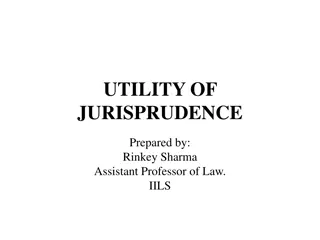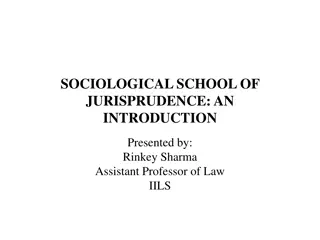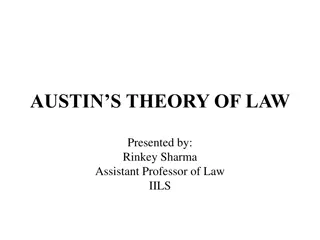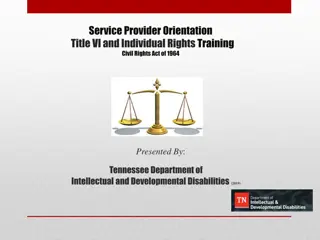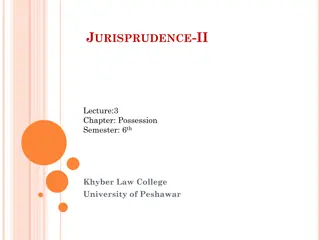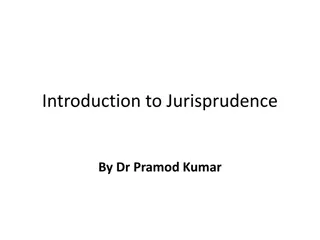Understanding the Basic Concept of Human Rights in Modern Jurisprudence
Human rights are natural and inalienable, essential for human life, based on universal principles. The concept of human rights is both simple and complex, requiring societal development and political will for implementation. Rooted in natural law theory, human rights have evolved from natural law to natural rights, as seen in historical revolutions. Theories by Locke, Dworkin, Stamler, and Fuller contribute to the understanding of human rights.
Download Presentation

Please find below an Image/Link to download the presentation.
The content on the website is provided AS IS for your information and personal use only. It may not be sold, licensed, or shared on other websites without obtaining consent from the author. Download presentation by click this link. If you encounter any issues during the download, it is possible that the publisher has removed the file from their server.
E N D
Presentation Transcript
Basic Concept of Human Rights BY DR. SUBIR KUMAR ROY ASSOCIATE PROFESSOR, DEPARTMENT OF LAW & REGISTRAR (ADDL. CHARGE) BANKURA UNIVERSITY
BASIC CONCEPT OF HUMAN RIGHTS Human rights inevitable for life as human being natural and inalienable rights it helps us to develop our personalities, qualities, talents, conscience etc. in order to satisfy our physical, spiritual and other needs. Human rights are based on universal natural right which is opposed to the thought of school of positivism. These rights are not subjected to the whims of any government and no legal system of a civilized and democratic country is supposed to abrogate these precious rights.
The issues of human rights are simple and complex; simple in its concept and complex in the nature of assuming its dimension which requires the development of a culture within the society on the principle live and let live and a strong political will for implementation. So this matter is not as simple as it appears.
The concept of modern human right jurisprudence can be termed as the brainchild of natural law theory. The edifice of the concept of natural law mainly stands on the concept of juscivil and jusgentium as it is developed by the Romans and afterwards both the principles have been transformed in jusnatural , contained those principles which ought to control the human conduct. During 17th and 18th centuries, natural law was considered as natural rights. The veracity of the above observation may also be endorsed through the opinion of Wolf who propounded in 18th century that natural law never denotes law of nature rather the rights which belongs to man on the strength of that law emanates from nature. The American and French revolution is biggest example of the above episode where the theory of natural law has been successfully transformed into a theory of natural rights.
According to Locke during the advent of the journey of human beings men and women were in a state of freedom and able to determine their actions in a state of equality. No one is subjected to will or authority of another. But in view of certain practical and political difficulties some sort of social contract has been formulated whereby the people mutually agreed to form a community and to set up a body politic without compromising certain rights such as, right to life, liberty and property etc..
According to Dworkin, human right is the theory, based on the equality of respect and concern. In later part of the 20th century Stamler and Fuller respectively added natural law with variable content and inner morality of law . The above principle signifies that law is created to achieve some purpose related with development of human being. the all-round
Today human right emerges as central feature of modern society. The modern concept of human right has a great relationship or intimacy with the term social justice. Social justice can be defined as promoting a just society by eliminating the driving forces behind the inequality, causes of injustice and valuing diversity. This can be achieved by equitable treatment, ensuring human right and fair distribution of community resources.
John Rawls theory of social justice gives emphasis upon the protection of equal access to liberties, rights and opportunities and pays special attention to the interest of the people of most disadvantageous section of the society.
Rawls has also considered the importance of human right . He himself acknowledges, A just world order is perhaps best seen as a society of peoples, each people maintaining a well-ordered and decent political regime, not necessarily democratic but fully respecting basic human rights.[1] [1] Rawls(2003:13)
Human right plays a very important role in Miller s theory of social justice. According to Miller the basic right of citizens involves concrete liberties, such as freedom of movement, freedom of speech etc. and thus the human right has multifarious dimensions
The socialist doctrine on human rights and freedom claims that while it attaches great importance to economic, social and cultural rights for the development of individual at the same time it gives emphasis upon the development of the society by guaranteeing and developing political and civil rights.[1] [1] Igor Blishchenko: International Humanitarian Law, Progress Publishers, Moscow(1989,78-79)
The concept of human right is part and parcel to the Indian civilization and it is wrong to say that this concept is the brain child of western thought . Swami Vivekananda writes, if there is any land on this earth that can lay claim to be the blessed punyabhumi, the land where humanity has attained its highest towards generosity, towards purity, towards calmness, above all, the land of introspection and of spirituality- it is India
VEDAS, PURANS, MAHABHARATA, BHAGWAT GITA AND VARIOUS OTHER RELIGIOUS SCRIPTURES GIVES EMPHASIS UPON THE PROTECTION AND TOWARDS THE BASIC RIGHTS OF EACH OTHER AND TO SAVE THE PEOPLE FROM THE MISERIES AND EXPLOITATION SHOWING RESPECT The concept of dharma was the epitome of rule of law which treated ruler and the ruled equally and contains the concepts of rights, duties and freedoms at length. Kautilyas Arthasastras beside induction of doctrine of Manu, which mainly deals with the civil and legal right, also inserted various right related to economy.
The blending of dharma(righteousness), artha(wealth), Kama(desire) and Moksha(salvation) not only lays birth to spiritual and material aspects of life but also the legal doctrines to maintain a perfect social order. Rigveda ordains for the regulation of the behavior of the ordinary person as well as the sovereign. The king whose dharma is to take care and to protect his subjects from any act of anarchism or arbitrariness, is also subjected to the law, made in heaven. The Rigveda ensures three civil rights, Tana(body), Skridhi(dwelling Place) and Jibhasi(life).
In the Language of Swami Vivekananda India acquired Immense of wealth (wealth of culture, civilization, religion and spiritualism) but never stood for imperial glory, wealth and power. Not by Progeny, not by wealth, but by renunciation alone immorality is reached . Indian civilization always has given due importance to peace over war, patience over non-forbearance, goodness over wickedness, brain over muscle and spirituality over worldliness
Magna Carta of 1215 whereby the Monarch armoured the people with some rights which could not be violated even by the sovereign. The Magna Carta was followed by the Petition of Rights of 1628 and Bill of Rights of 1688. However it is needed to keep in mind that in England during this period it was a struggle between the barons and landed aristocracy on one side and the king on the other and the people were nowhere in the picture
FRENCH DECLARATION OF RIGHTS OF MAN OF 1789 based upon the principle of Natural Rights and given the guarantee of a bunch of rights, comprised within 17 Articles and have been regarded as universal one
American Bill of Rights of 1791 COLLECTIVE NAME OF THE FIRST TEN AMENDMENTS INSERTED CONSTITUTION OF AMENDMENTS ARE INCORPORATED IN ORDER TO ENSURE AND PROTECT SOME NATURAL RIGHTS OF LIBERTY INCLUDING FREEDOM SPEECH, PRESS, ASSEMBLY ETC. INTO THE AMERICA. THESE AND OF PROPERTY RELIGION,
The development of modern concept of human right accelerated after the Second World War
After the end of the World War II in 1945, the representatives of fifty nations met at San Francisco to draft the United Nations Charter and kept the UN under the obligation to promote and respect for human rights and for fundamental freedoms for all without making any discrimination and ultimately which throughArt.55 of the UN charter. Through Art.56 of the UN charter the members pledged themselves to cooperate with the organization in order to achieve the noble ideals of Art. 55. The San Francisco conference was followed by a number of covenants and has been coined conventions.
Universal Declaration of Human Right ,1948 THE CONSISTS THIRTY ARTICLES THROUGH WHICH IT VOWS TO PROTECT THE CIVIL AND POLITICAL RIGHTS AS WELL AS ECONOMIC, SOCIAL AND CULTURAL RIGHTS OF ALL UNIVERSAL OF DECLARATION PREAMBLE A AND
Karel Vasak classified the human rights into three generations. FIRST GENERATIONS CONSISTS OF CIVIL AND POLITICAL RIGHTS. INTERNATIONAL COVENANT ON CIVIL AND POLITICAL RIGHT, 1966 THE COVENANT ON CIVIL AND POLITICAL RIGHTS MAINLY DEALS WITH THE RIGHTS RELATED TO CIVIL AND POLITICAL AS SUCH THE RIGHTS OF SELF DETERMINATION, RESPECT FOR ALL, EQUAL RIGHTS OF MAN AND WOMAN, RIGHT TO LIFE, LIBERTY, SECURITY, PROHIBITION OF TORTURE, RIGHT AGAINST SLAVERY, FREEDOM OF THOUGHT, RELIGION, EXPRESSION AND OPINION, RIGHT TO PRIVACY, RIGHT TO VOTE ETC.
The Covenant of Social Economic and Cultural right, 1966 came into force 3rd January, 1976. second generation consists of social, economic and political rights mainly related with the right to subsistence. Mainly it consists of the right to work in proper environment, social security, adequate standard of life, education, to form union, to take part in cultural rights, to enjoy scientific progress etc. the benefits of
The third generation of human right relates to solidarity rights. These rights are the most debated and lacks both legal and political recognition. RIGHT TO SELF DETERMINATION, RIGHT TO ECONOMIC AND SOCIAL RIGHT TO NATURAL RESOURCES, RIGHT TO POLLUTION FREE ENVIRONMENT, RIGHT RELATED TO CULTURAL HERITAGE, RIGHT RELATED TO COMMUNICATION ETC. ARE THE EXAMPLE OF SOLIDARITY RIGHT. DEVELOPMENT,



